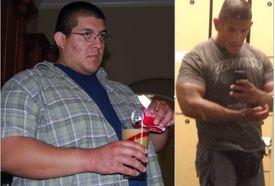4 years of hard work and I'm...slower

DonPendergraft
Posts: 520 Member
Just for kicks I did a MAF test for the first time in 4 years. I haven't been doing the heart rate training Maffetone recommends in years. I've been doing intervals, hills, tempo runs, etc. I believe I'm stronger and my joints thank me. However, I'm sad to report than I'm a full 2 min/mile slower than I was since my last test. Not sure exactly why. Phil would prolly tell me I've just over-trained and I can get it back by returning to his methods. I hope that's it and I'm going to go back to this type of training that worked well for me in the past and just hope it's not really because I've just gotten 4 years older and am just slowing down. Just a bit depressing to work hard for 4 years only to see myself get slower. The chase for cutoffs has been getting tougher and now I know why. I'm not really asking for solutions (though I'm always open to advice), I'm just whining and want sympathy! Heh.
0
Replies
-
Sounds like you neglected your aerobic engine to me.0
-
Exactly right. Needs some TLC, that's for sure.CarsonRuns wrote: »Sounds like you neglected your aerobic engine to me.
0 -
Incorporate some runner specific strength training into your exercise plan. You'll get some spring into your step and carry yourself better. Our muscle mass starts to decrease rapidly as we age so you have to fight against that. I'm not saying that's the answer but give it a try.0
-
In that link you posted it says to do the test often. Two data points in four years is tough to interpret. It is also challenging to lose weight and increase performance simultaneously.
What pace were you testing at and what HR?0 -
chemlabdoc wrote: »It is also challenging to lose weight and increase performance simultaneously.
How so? The simple act of losing weight increases performance. So, you would actually have to lose fitness while losing weight to remain in the same place from a performance perspective. The generally accepted performance increase from weight loss is 1 to 2 seconds faster per mile for every pound lost.
0 -
chemlabdoc wrote: »In that link you posted it says to do the test often. Two data points in four years is tough to interpret. It is also challenging to lose weight and increase performance simultaneously.
What pace were you testing at and what HR?
I don't know about that. Unless you are feeling sick or coming off a huge effort, a MAF test should be a pretty good picture. But I plan on taking it monthly for awhile to see if it improves.
OK as for pace and HR, I'll tell you even though it's embarrassing to me. Anyway, here goes:
10/27/11 I ran my first mile at 11:49 pace onto my fifth mile 11:50 pace avg HR 128.2
4/19/15 I ran my first mile at 13:56 onto my fifth mile at an 14:10 pace avg HR 129.4
Of course if I decide to do it at my HR at 160 I would go much faster. But that's not the point of the test. Take 180 minus your age to know what HR you need to try to avg for the test. So if you are 25 it would be 155bpm, not my 130bpm. I guess my avg HR used in 2011 may have been just a tad high. Anyway, the difference is disappointing.0 -
Strength training has helped my speed tremendously. And learning to keep my slow long runs at least two min/mile slower than goal pace. It's hard to do but that's how the successful pros do it! They log the miles but at a recovery pace.0
-
Thanks for the numbers Don. I tried to look at Strava to compare numbers and it turns out that I can't come to any reasonable conclusions. If it helps I present my rambling below. If not...oh well.
Everyone's max HR and training zones are different. The 220-age thing=max doesn't work for most people. The Maffetone method depends on this type of age formula but the 180-age is just the starting point. If you are in good shape you can add 5bpm. I would try the test at multiple HR to make sure you really are slower. Here for comparison are my numbers from recent runs:
130 HR is 10:59 pace
131 HR is 10:28 pace
137 HR is 9:25 pace
148 HR is 8:58 pace
153 HR is 8:40 pace
165 HR is 8:08 pace
My max HR is 198 (measured in a lab, nothing to do with age)
Note that on the low end 1bpm can make a huge difference.
I think that your numbers will be similar. On 5-15-14 you ran two miles on the track and averaged 8:20 with 163 HR. But you also a couple 8 minute miles at HR 145 on 4-18-14. Maybe there was something in the coffee that day. And more recently on 3-22-15 you went 9:46 pace at 158 HR. The numbers are all over the place.
For the Maffetone training zone, that number you calculate (180-age+fitness) is what he calls "max aerobic training HR." For you this is either 130 or 135. This is the HR that you should be training the most at.
Looking at your Strava numbers you seem to do the most of your training in the 105-120 range.
If you really are slower it may be because you are training at too low of HR. Since you did RR50 at 130 HR that should be the bottom end of your training range--the slowest that you want to run.
I think with any method such as the Maffetone method, there will be many supporters whom it works for because their HRs match his zones. There are also many that it won't work for because the numbers are too low or high.
I also think you are faster than this test makes you think. Getting back to the point of taking the test more often. You could have been super fit in 2014 and missed the measurement. So you won't know if you got slower last year after being faster or if it was a gradual decline each year due to age.
I'm sorry that you feel slow and want to help,
Jack
0 -
I got this from a book. Either Noakes or Fitzgerald. It regards a study of cyclists trying to either lose weight, increase performance, or both. The study determined that the performance gains of the both group were inferior to the gains of the not losing weight group. This was done with already fit people. I didn't mean to imply that performance can't improve while losing weight, just that it can be more difficult than while on maintenance.CarsonRuns wrote: »chemlabdoc wrote: »It is also challenging to lose weight and increase performance simultaneously.
How so? The simple act of losing weight increases performance. So, you would actually have to lose fitness while losing weight to remain in the same place from a performance perspective. The generally accepted performance increase from weight loss is 1 to 2 seconds faster per mile for every pound lost.
I have personally seen huge gains in speed from losing weight. I am also going to continue to try to get faster after meeting my goal.
0 -
chemlabdoc wrote: »
I got this from a book. Either Noakes or Fitzgerald. It regards a study of cyclists trying to either lose weight, increase performance, or both. The study determined that the performance gains of the both group were inferior to the gains of the not losing weight group. This was done with already fit people. I didn't mean to imply that performance can't improve while losing weight, just that it can be more difficult than while on maintenance.CarsonRuns wrote: »chemlabdoc wrote: »It is also challenging to lose weight and increase performance simultaneously.
How so? The simple act of losing weight increases performance. So, you would actually have to lose fitness while losing weight to remain in the same place from a performance perspective. The generally accepted performance increase from weight loss is 1 to 2 seconds faster per mile for every pound lost.
I have personally seen huge gains in speed from losing weight. I am also going to continue to try to get faster after meeting my goal.
Yeah, that was Fitzgerald in Racing Weight. In the context of fit athletes trying to trim the last 5 pounds, yes, weight loss diminishes fitness gains, but doesn't negate them. For most recreational runners, they will experience huge gains with weight loss, especially when combined with increased mileage.0 -
chemlabdoc wrote: »Thanks for the numbers Don. I tried to look at Strava to compare numbers and it turns out that I can't come to any reasonable conclusions. If it helps I present my rambling below. If not...oh well.
Everyone's max HR and training zones are different. The 220-age thing=max doesn't work for most people. The Maffetone method depends on this type of age formula but the 180-age is just the starting point. If you are in good shape you can add 5bpm. I would try the test at multiple HR to make sure you really are slower. Here for comparison are my numbers from recent runs:
130 HR is 10:59 pace
131 HR is 10:28 pace
137 HR is 9:25 pace
148 HR is 8:58 pace
153 HR is 8:40 pace
165 HR is 8:08 pace
My max HR is 198 (measured in a lab, nothing to do with age)
Note that on the low end 1bpm can make a huge difference.
I think that your numbers will be similar. On 5-15-14 you ran two miles on the track and averaged 8:20 with 163 HR. But you also a couple 8 minute miles at HR 145 on 4-18-14. Maybe there was something in the coffee that day. And more recently on 3-22-15 you went 9:46 pace at 158 HR. The numbers are all over the place.
For the Maffetone training zone, that number you calculate (180-age+fitness) is what he calls "max aerobic training HR." For you this is either 130 or 135. This is the HR that you should be training the most at.
Looking at your Strava numbers you seem to do the most of your training in the 105-120 range.
If you really are slower it may be because you are training at too low of HR. Since you did RR50 at 130 HR that should be the bottom end of your training range--the slowest that you want to run.
I think with any method such as the Maffetone method, there will be many supporters whom it works for because their HRs match his zones. There are also many that it won't work for because the numbers are too low or high.
I also think you are faster than this test makes you think. Getting back to the point of taking the test more often. You could have been super fit in 2014 and missed the measurement. So you won't know if you got slower last year after being faster or if it was a gradual decline each year due to age.
I'm sorry that you feel slow and want to help,
Jack
I will check into a more precise HR number to see if it needs adjusting. My max is probably higher than 180 though. I say that because I was running in mud in November and was pushing at 177bpm. Weird. Going through an intense section of muddy trail had my HR higher than any interval or hill workout that I had done! But I doubt I could muster 3 beats shy of max on any trail run. But it's all relative. I used the same formula both times. It's like if you scale is off by 2lbs. Who cares as long as you only use that scale.
Perspective! This man's got it. I'm glad you went back and looked at some of my runs. Yeah, I remember those days and they were fairly recent. I guess they count huh? Here's a partial explanation. My body is weird. I tend to recover slowly. When I busted out those fast runs, I couldn't approach it again for quite some time. My legs feel tired and I can't move them. To be honest, and this is bad, sometimes I struggle doing a Maffetone type run. For me that would be trying to run at 130bpm. Sometimes it's not hard. The rare occasion it's hard because i feel good and want to run faster, and there are many days when I would get up very early an a winter morning and I'm so tired I'm OK with bumping along at barely over 100bpm. That's probably a good definition of "junk miles", just shuffling along. But there have been times like that when it's a struggle to push. I don't know what to attribute it to. Age? Weight? And if I'm already divulging embarrassing information, then I would throw (diagnosed but untreated) hypogonadism (low-T - less than 200) into the mix. Never shared that before. But I'm tired a lot.
End the end, I run because I love running. So regardless of performance I will keep plugging along. But I would be lying if I didn't admit to wanting more. Who doesn't? But your post gives me hope.0 -
Maybe start tracking your food intake pre-run to see what difference it makes. Since I'm mostly doing aerobic runs, (and for other reasons) i run fasted, but in Garmin Connect there was this one anomalous run where I ran much faster (esp towards the end) and I remember the run being easy at the time, so I went back and looked and it was a very rare day that I ate pre-run. So those Winter mornings you're talking about might just feel only like puttering along because you haven't fueled. Even though aerobic/Maffetone runs *mainly* burn fat, they also burn carbs too in a lower ratio than a harder run, so not being fueled can and does make a difference.0
-
I have never tried this test though I certainly have been doing heart rate training. And I've gotten pretty good at relating my heart rate zones to pace and training to that combination of pace and heart rate.
My maximum tested heart rate is 199 beats per minute and that was clearly a maximal output, anaerobic output.
One test I do run periodically is one either similar to or identical to what Fitzgerald recommends: on my Digifit program it is referenced as a Critical Power 30 minute test. Very different from the MAF test, it is a 30 minute, sustained, maximal output test. I typically perform the test every couple of months to set or adjust my HR zones. But once I reached a certain level of fitness, the zones don't change much, only the distance covered has. The estimated VO2max and the Lactic Acid Threshold Heartrate have also improved.
When I go back to running next month, this test is one of the first tests I'll run to give me a sense of reality.0
This discussion has been closed.





